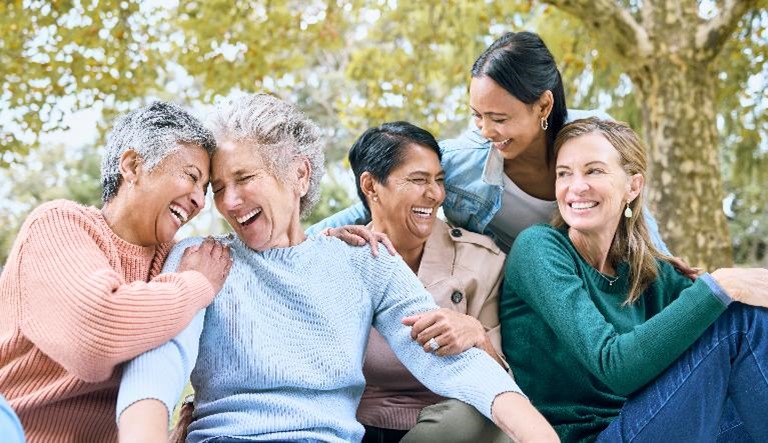October is Menopause Awareness Month, and October 18th is World Menopause Day!
Let’s take a moment to highlight the significance of these events and why they matter.
Menopause isn’t just a personal experience; it affects society, working environments, relationships, and an individual’s quality of life.
So why Menopause Awareness Month and World Menopause Day?
Quite simply, these occasions provide a platform to break the silence regarding what has traditionally been a “taboo” topic in most societies and cultures. They help to raise awareness of menopause and its significant impact on women’s lives, relationships, and careers.
Importantly, they also help to highlight the support options available to women for improving their health and quality of life.
It’s crucial to openly discuss this very natural and inevitable phase of life, as it impacts individuals and our communities.

What are the effects and impacts?
Effects on Society:
Menopause affects women from all walks of life. Acknowledging it helps create inclusive workplaces and healthcare systems, supporting women during this transition.
Impact on Relationships:
Navigating menopause can be challenging for individuals and their loved ones. Open dialogue fosters understanding and empathy within relationships.
Physical and Psychological Symptoms:
Menopause comes with many physical and psychological symptoms – and the list is long! From hot flashes and mood swings to sleep disturbances, changes in libido, depression, anxiety, and brain fog, to name a few. These symptoms can significantly affect one’s well-being, functioning, and day-to-day quality of life.
Long-term effects
Symptoms can linger long after menopause has occurred, and the effects of being in an oestrogen-deficient state can be long-term and impact all parts of the body. Women are at increased risk for osteoporosis, higher blood-pressure, cardiovascular diseases, and some cancers.
Whilst the impact of menopause on a person’s quality of life can undoubtedly be profound, it’s essential to know that various options are available to manage these symptoms, including lifestyle changes and hormone therapy.
What can you do?
See your GP or Healthcare Provider
Perhaps you don’t “quite feel yourself” anymore. Physically and psychologically, things may have shifted from what is “your normal”, and you might be experiencing physical and/or psychological symptoms commonly associated with perimenopause or menopause.
As a first step, I would encourage you to note down your symptoms and go and see your GP or regular healthcare provider to discuss what is occurring for you. It’s important to remember that every woman’s experience with menopause is unique, and what works for one person may not work for another.
Your GP or healthcare provider can help you to navigate the changes and symptoms you are experiencing and provide you with treatment options, if applicable, all while considering the impact to any existing underlying health conditions.
Seek Assistance with Lifestyle Changes
Regardless of treatment choices your GP or healthcare provider advises, maintaining a healthy lifestyle can help you manage perimenopausal and menopausal symptoms. The lifestyle versus medicine debate continues to rumble away; however, these should not be presented in opposition to one another, but rather as complimentary – lifestyle and medicine should work together.
Lifestyle modifications can be a powerful adjunctive tool, alongside other treatment options, and they may not only alleviate some of the discomfort associated with menopause but also contribute to your overall health and well-being.
Small, sustainable changes to diet, movement, stress management, weight management, and sleep not only promote health but also help to lower disease risk and manage chronic conditions.

If you find yourself in the perimenopause or menopause phase of the lifespan and would like some advice on lifestyle changes that might support your journey, please do reach out.

Dr. Bujtor, the founder of Lifespan Nutrition, and a clinician here at Springbank Clinic, is an experienced, university-qualified, registered nutritionist (RNutr), specialising in human nutrition across the lifespan, with a particular focus on women’s health and paediatric nutrition (birth to 18 years).
As a woman, a mother, and someone who is firmly in the perimenopause phase of her own life, Dr Bujtor understands the importance and benefits of adequate and appropriate nutritional intake and optimal lifestyle in these periods.
She is passionate about helping other women understand how leveraging small lifestyle and dietary changes can provide powerful support in navigating these key life stages, and changes, to optimise physical and mental health and well-being.
Related posts
PEACE & LOVE : Soft Tissue Healing Guide
Have you wondered what the best approach is for treating a soft tissue strain? I’m…
TOP FIVE REASONS WHY YOU SHOULDN’T USE COTTON BUDS
Dr Jay Jindal Au.D. FSHAA, Consultant Audiologist In a survey in South East England, it was found…
Inflammation — does our diet foster a hero or a villain?
For the past few years along-side my clinical work I have been a scientific researcher…
Alzheimer’s & Hearing
Take the first step to curb dementia World Alzheimer’s Month/Day: September is World Alzheimer’s Month…

